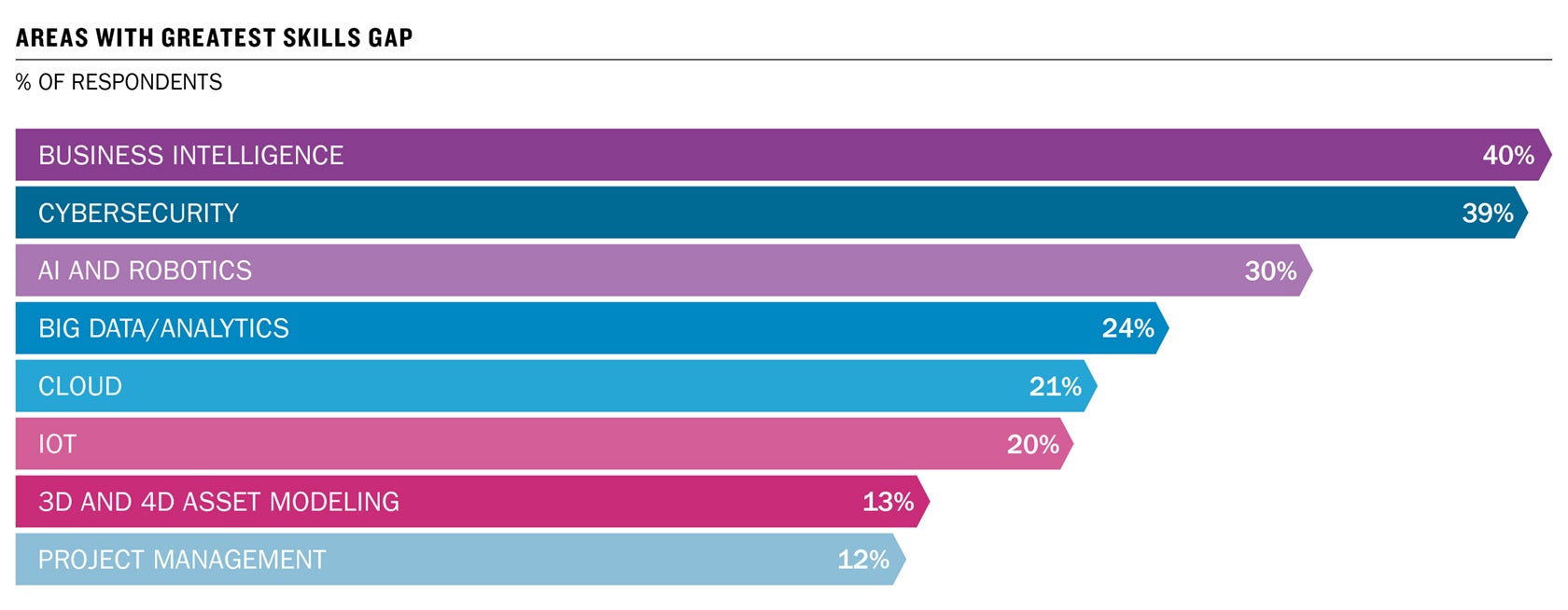Successful digital transformation hinges upon the people within an enterprise who will enable and transform the company. While digitalization is about increasing customer-focused business, the transformation itself is about building skills and putting employees before the customer. Getting this part right will, in turn, drive better customer service and satisfaction.
To achieve it, senior management must change the status of transformation in the minds of their employees from threat to opportunity. To do that, they must build two bridges. The first spans from the vision of the company in its current state to how it will appear in the end state. The second bridges the gap in skills, guiding the workforce through the transformation of talent and knowledge needed.
The gap businesses perceive between their existing skill set and the necessary skill set is very real. Over one in three (34 per cent) feel either slightly or totally unprepared to deal with this talent deficit. Similarly, 20 per cent of firms do not feel that there is a consistent and informed understanding of the strategic direction and business performance of the company throughout the organization.
This points to a need for strong leadership and informed strategy, and a collaborative approach to working within a firm. A key focus for companies looking to achieve integration is to boost collaboration. At a cross-industry level, the delta between desired levels of collaboration and actual levels is 2.3 points on a ten-point scale – meaning that businesses want to increase levels of collaboration by 37 per cent.
Firms are already engaging in this way. In May 2017, engineering company Polypipe – based in Doncaster in the UK – became the 100th firm to join the University of Sheffield Advanced Manufacturing Research Centre (AMRC) with Boeing, a major training and research facility. A big draw was the development of the AMRC’s Factory 2050 – a facility dedicated to collaborative research into “reconfigurable digital assembly and flexible component manufacturing”.
The pressure to take advantage of digital transformation – particularly as competitors seize upon opportunities – is growing. Finding these partnerships will confer major advantages.
Greatest gaps and gains
Within the audit process, a business can assess where the gaps are, map out the processes and identify duplication. It can then address these gaps and overlaps through partnerships, skills development and application of technology to support teams.
The greatest concern around the talent shortfall is around business intelligence (BI). This is particularly felt in the service providers sector, where 52 per cent highlight it. Beyond BI, gaps are notably found in cybersecurity and artificial intelligence/robotics, with respondents from construction and aviation businesses showing conspicuous concern with the former and those from manufacturing with the latter.
Taking expert guidance from partners in these areas can build up the skill sets and technological capabilities that are needed to increase collaboration, facilitating the strategic transformation of the business.
In the context of coping with a more fluid and transient workforce, 23 per cent of firms feel they do not have the culture and structures in place to adapt quickly and effectively to new processes and applications. Third parties can supplement any areas where there are deficits in either process or structure, to move firms forwards.
Respondents cite both the upskilling of existing talent and external recruitment in the top three responses to the impact of digital disruption
Not every project will be successful. Senior management downwards must enter into the process with a mindset not afraid of failure, but instead willing to learn from it and take those learnings into the next project.
And yet there is great awareness of the need to bring people through the transformation process. Respondents cite both the upskilling of existing talent and the external recruitment of digital talent in the top three responses to the impact of digital disruption. Some 62 per cent of firms identify the upskilling of existing talent as the best way of dealing with the disruption.
This suggests that very positive lessons have been learned from the digitalization process that firms have already engaged with. However, 38 per cent of businesses still need to realize the importance of this to existing talent.
Having seen one client acquire a training business specifically to develop talent, IFS expects that the appetite for apprenticeships and skills development programs will grow as the urgency to embrace digital transformation gathers pace.

